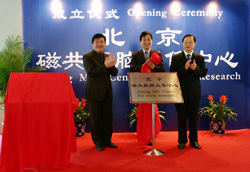
Vice Minister of Science and Technology Liu Yanhua (middle), Vice Minister of Health Jiang Zoujun (right) and CAS Vice President Chen Zhu attended the ceremony.
A group of world-class scientists in brain imaging came to China's capital to witness the inauguration of the Beijing MRI Center for Brain Research, which was officially opened on May 25 at the CAS Institute of Biophysics.
Magnetic resonance imaging (MRI) is a diagnostic scanning system based on the principles of nuclear magnetic resonance. It yields finely detailed three-dimensional images of structures within the human body without exposing the patient to harmful radiation. The technique is invaluable for imaging the soft tissues of the body, in particular the brain and the spinal cord.
As one of China's major initiative to promote the integration of its researchers into the world scientific community of cognitive science, the US$ 2.5-million center has been jointly invested by the Ministry of Science and Technology, CAS and the Ministry of Health. The center is equipped with the country's first 3 Tesla ultra-high field magnetic resonance system solely devoted to research, Magnetom Trio of Siemens, with which Chinese scientists do not have to compete with clinicians for scanning time on hospital MRI machines.
"This center is not only for us," said Prof. Lin Chen, director of the new center and of the Key Laboratory of Cognitive Sciences under CAS. "It is a national center that will be open to all the scientists who are interested in neuroimaging in all the universities and institutes around the country."
"This is really going to put Chinese neuroscience on the map," said Robert Desimone, scientific director of the US National Institutes of Mental Health (NIMH) and a co-chair of the new center's scientific committee. A third of the advisory committee is from overseas. "That has not been the usual way of doing things in Chinese science," Desimone is quoted as saying, "although increasingly it is becoming so."





